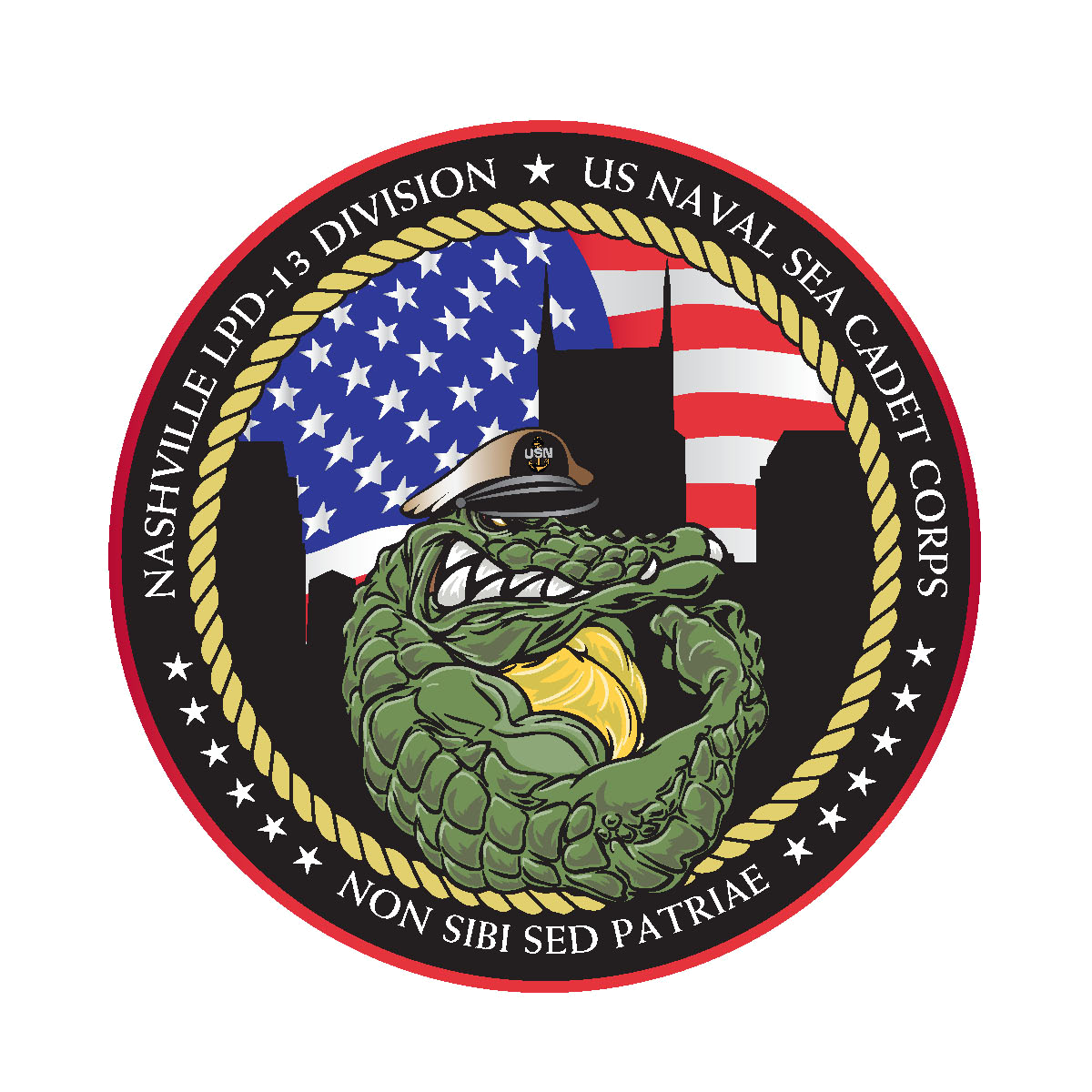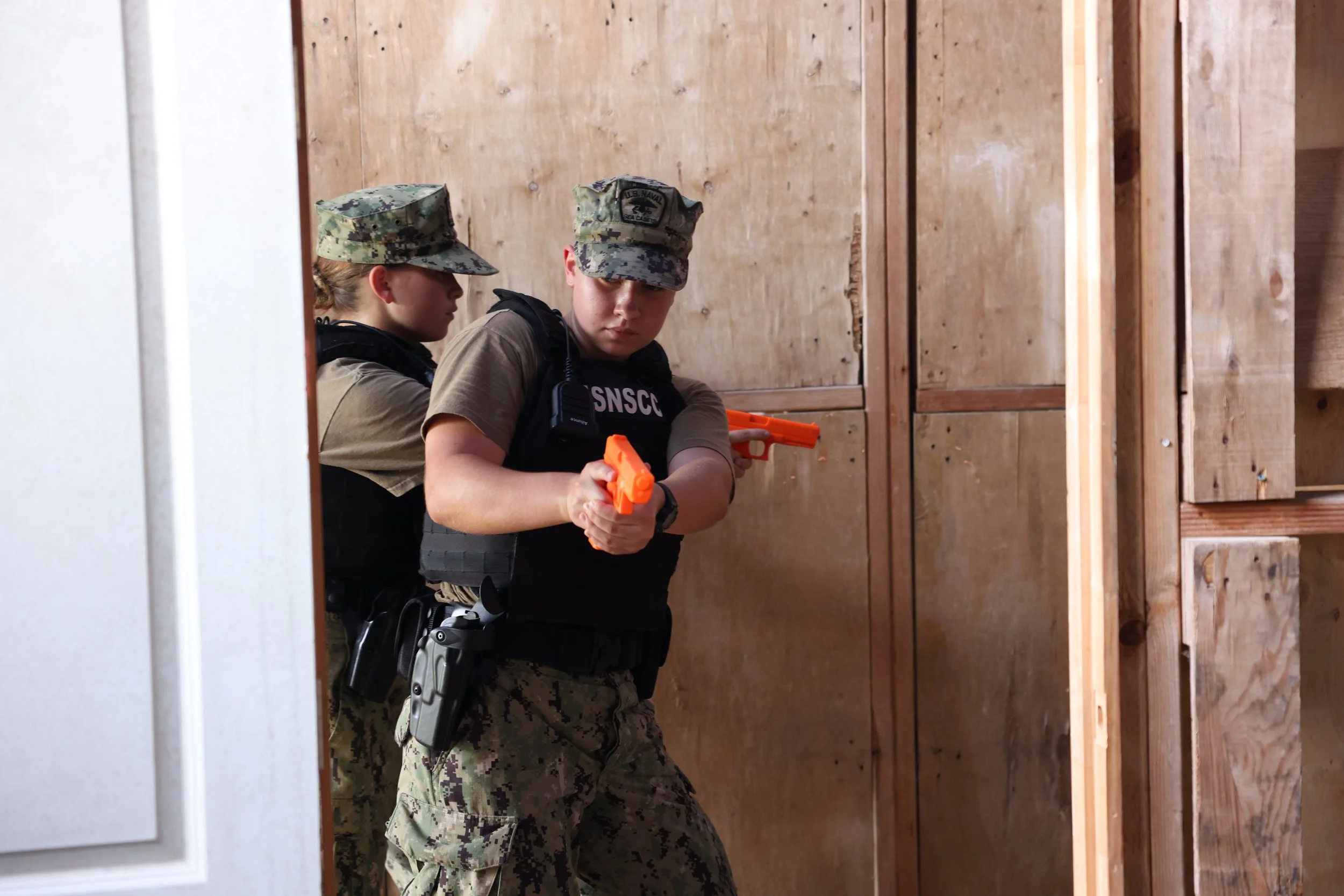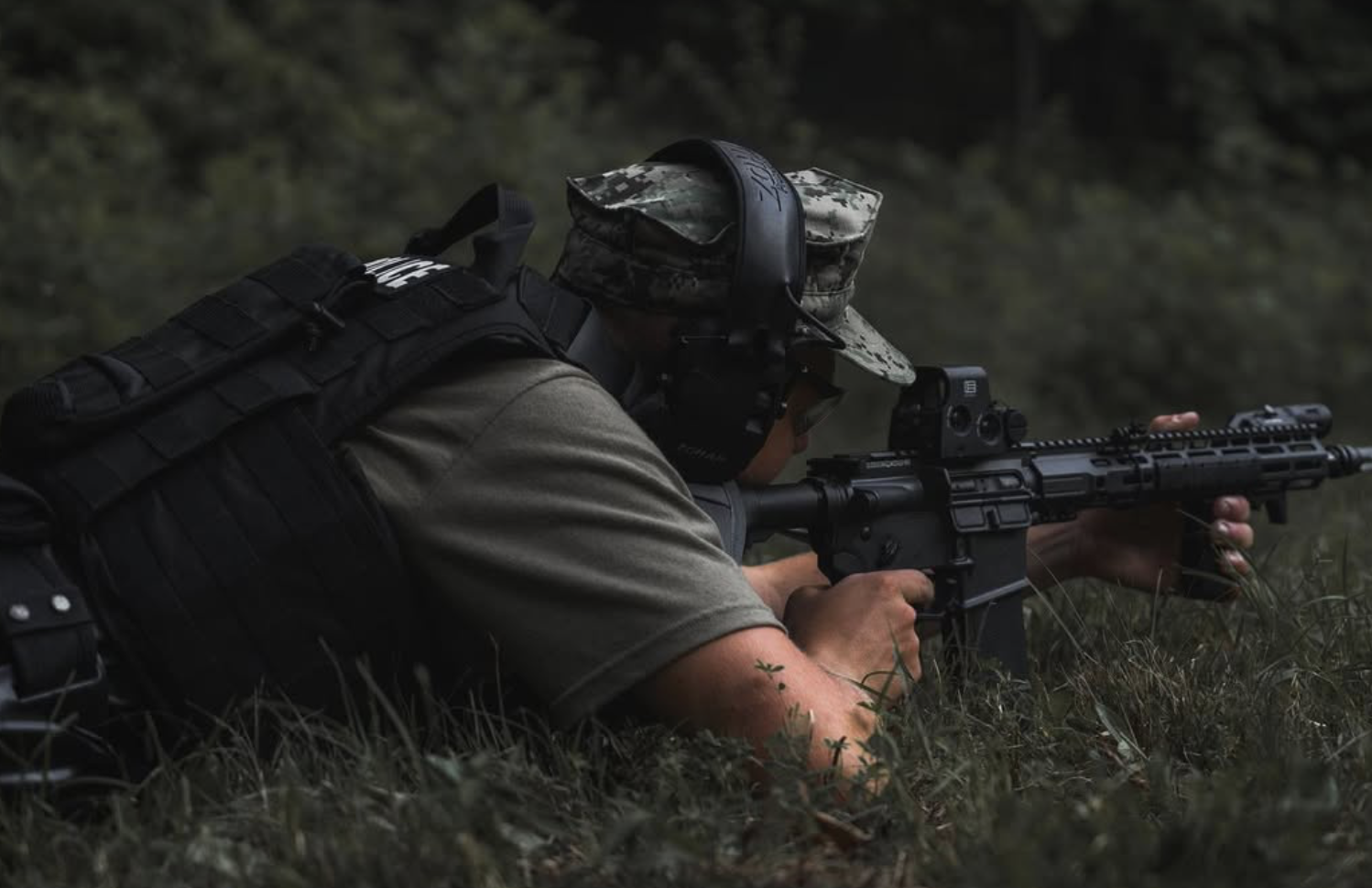
Advanced Master at Arms and Law Enforcement Training
AMAALET
CAMP LIBERTY 2025
Registration Opening Soon
MISSION:
The mission of the NSCC Advanced Master-At-Arms and Law Enforcement Training is to empower cadets with the leadership and life skills necessary to excel in any endeavor they pursue. Cadets learn about the world of law enforcement using intense hands on and classroom courses. Through rigorous physical and mental challenges, cadets learn to navigate life’s adversities with resilience and integrity, holding themselves to the highest personal standards.
PURPOSE:
The Advanced Master-At-Arms and Law Enforcement Training program provides a unique opportunity for cadets to engage with professional police officers, gaining firsthand knowledge about the field of policing in a physically intense and hands-on environment. By fostering a culture of discipline, teamwork, and attention to detail, we aim to mold cadets into principled leaders capable of making positive contributions to their communities and beyond. The training takes cadets from the most basic foundations of law enforcement training to some advanced skills and tactics. Cadets are expected to give 100% effort while at this training. The training is physically intense and incredibly challenging both mentally and academically. However, we use law enforcement skills and education as a platform to push cadets further than they thought they could go. Cadets do not have to be the fastest, strongest, or smartest individual in the class; as long as they strive to be faster, stronger, and smarter than they were the day before.
GOALS:
The goal of this training is to provide cadets with a physically and mentally demanding law enforcement training program that instills discipline, teamwork, and attention to detail. Through rigorous physical conditioning, simulated real-world scenarios, and comprehensive education on law enforcement principles, our program aims to:
Develop Physical Fitness: Enhance participants’; physical strength, endurance, and overall fitness levels.
Foster Mental Toughness: Cultivate resilience, adaptability, and critical thinking skills to effectively navigate high-stress situations commonly encountered in a law enforcement career and in everyday life.
Instill Discipline and Respect: Promote a culture of discipline, respect for authority, and adherence to ethical standards.
Provide Practical Skills Training: Offer hands-on training and experience in law enforcement tactics, procedures, and techniques, preparing participants for the challenges law enforcement professionals face in the field.
Promote Leadership and Teamwork: Encourage the development of leadership qualities, effective communication, and collaboration within a team environment.
Educate on Legal and Ethical Responsibilities: Provide comprehensive education on legal statutes, regulations, and ethical considerations governing law enforcement actions, ensuring cadets understand their responsibilities as good citizens.
Prepare for Future Opportunities: Equip participants with the knowledge, skills, and confidence to pursue further education or career opportunities in law enforcement or related fields.
Through these goals, our program aims to empower cadets with the tools and mindset necessary to understand and consider the field of law enforcement while fostering personal growth, character development, and a commitment to serving their communities with integrity and professionalism.
PREREQUISITES:
NSCC Cadets must be at least 15 years old to participate in the training.
The cadet must pass a Physical Readiness Test (PRT) (at a LEVEL 4 or above) prior to being released to attend training. The unit CO’s endorsement of the request for training in Magellan, certifies the cadet is physically prepared for training.
The cadet must write a 500 word essay to be submitted prior to acceptance to the training, essay must include the following: Why do you want to attend MA / LE training at Camp Liberty? What do you expect to take away from this training? Many cadets apply every year, why should you be selected to attend?
The cadet must obtain the required uniform items (Sea Bag List) and comply with directives as prescribed by the Officer in Charge (OIC) of the training.
The cadet must study and memorize the materials sent prior to arrival at training.
The cadet must acknowledge the welcome letter and expectations prior to training.
The cadet must have successfully completed a USNSCC approved RT training and preferably on other Advancement Training (AT)
Recruits will receive an entrance examination over materials to have been memorized prior to arrival, a general knowledge quiz on officer safety and other related material, a written law exam following the last day of classroom study, and must take and pass a final practical exam (Reality Based Training) graded by the training staff.
TESTING AND PRACTICAL PERFORMANCE:
EVALUATIONS:
Each Recruit will be evaluated upon the completion of the training using the following standards and graded accordingly:
Performance - Skill and efficiency at assigned training tasks.
Military Bearing - Personal behavior; adherence to the USNSCC Core Values and Cadet Code of Conduct; attention to instructions and orders; maturity; self-discipline.
Personal Appearance - Neatness in person and dress; conformity with NSCC uniform regulations and grooming standards.
Teamwork - Prioritization of team over self; willingness to help others; interpersonal skills.
Motivation – 100% participation. Drive; enthusiasm; esprit de corps.
Resilience – Growth and progression, personally and with their team, in adversity.
Leadership – Cadet’s ability to plan, direct, motivate, delegate, and lead by example.
Final Exam - A cumulative score based on the cadet’s academic exam and final practical exam scores.
PRT - A physical readiness test.
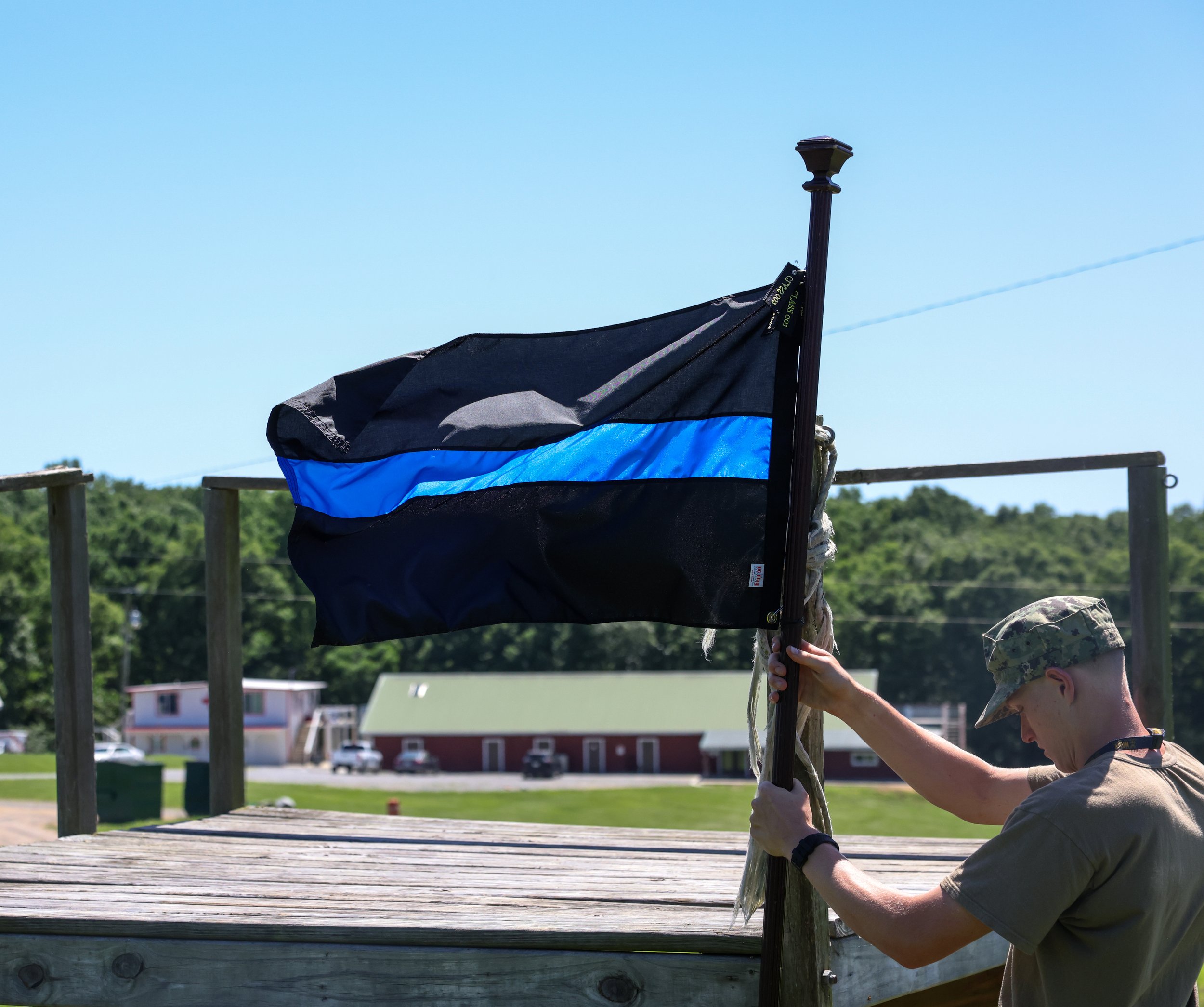
Cirriculum:
Advanced Master-At-Arms and Law Enforcement Training will follow an established curriculum which includes a total of approximately 120 hours of direct instruction, to be supplemented by confidence- and team-building activities:
Classroom Instruction
History of Law
Overview of American Government
Constitutional Law
Searches and Seizures
Constitutional Protections
Courts and Statutory Law
Relevant statutes and application
How courts work
Courtroom procedure and testimony
Case Law
Mock Hearing
Radio Communications
Report Writing
Forensics
Use of Force
Standards of Proof
Officer Safety and Survival
Video presentations
Officers share experiences
Defensive Tactics
Handcuffing techniques
Hand and Foot Strikes
Grappling and suspect control techniques
Room Clearing
Deliberate
Dynamic
Breaching techniques
Traffic Stops
Standard Traffic Stops
Low-Light Traffic Stops
Felony / High Risk Traffic Stops
Firearms
Nomenclature
Safety
Weapons Handling
Cleaning
Firing Positions
Live Fire
Forensic Applications
Crime scene processing
Fingerprinting identification and collection
Investigative Methods
Search Warrant Planning and Execution
Active Killer Response and Training
Citizen response to active killer
Understanding safety and active aggressors
Tactical Emergency Casualty Care
MARCHE algorithm
Practical application of TECC
CPR and First Aid Certifications
Physical Training (predesigned PT applicable to law enforcement training for cadets)
Personal growth
Team building through adversity



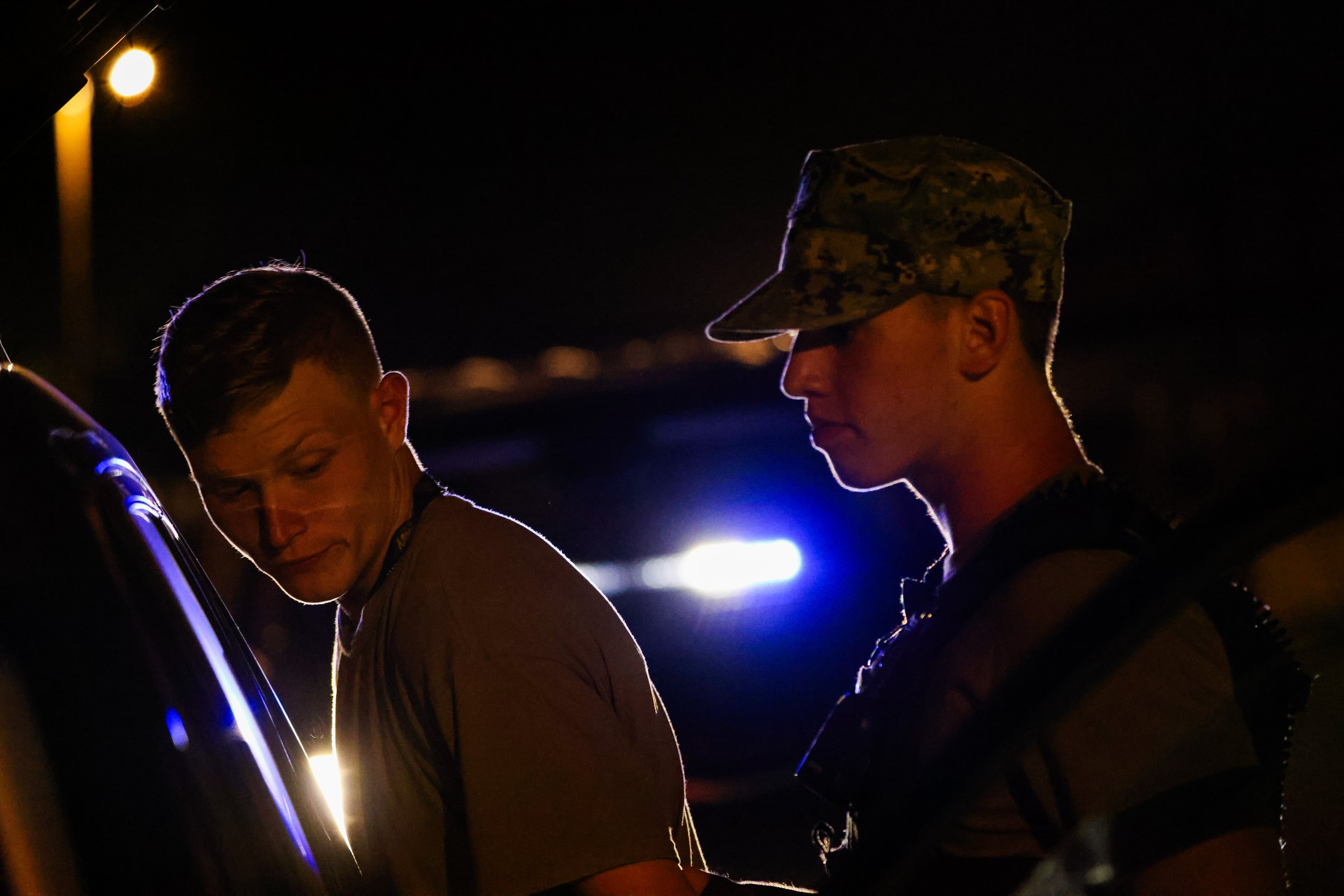


AMAALET 2024 at Camp Liberty in Battleground, AL. Cadets had an epic time learning the ins and outs of a law enforcement career.
Cadets located a wanted subject at his mother's residence. They wrote a search warrant, and sent their SWAT team to retrieve him. This was a training evolution for the USNSCC Law Enforcement/Master At Arms training at Latimer summer training contingent in TN.
Latimer Summer Training Contingent 2019 Master at Arms Training Cadets focused on building the skills necessary to become better leaders and better serve their communities. DISCIPLINE, TEAMWORK, ATTENTION TO DETAIL!
What is next?
Registration will be available through Magellan. Submit your essay and registration via the information on Magellan. Registration should be available on February 1, 2025 for the 2025 training.
